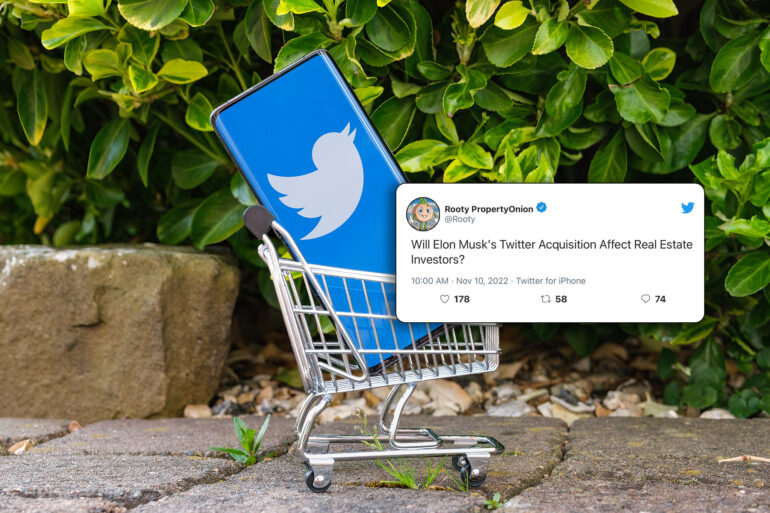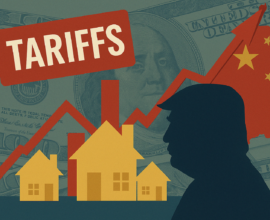Will Elon Musk’s Twitter Acquisition Affect Real Estate Investors?
Anyone who has been following the news knows that Elon Musk officially purchased Twitter for $44 billion. The deal’s closing took months of back and forth before it finally set in. While there is a great deal of debate about what happens once this popular app moves out of the publicly-traded sphere into private ownership, many real estate investors are beginning to wonder how this acquisition will impact the real estate market.
While news sites report events after they happen, Twitter and other social media platforms report things in real-time, which can make a real difference for investors.
Companies change leadership all the time, so why would Elon Musk taking charge of Twitter raise concerns about the real estate market? Some of the most valuable debates about the housing industry happen on Twitter; therefore, how the world understands the housing market could fundamentally change with new leadership.
Read on to learn more about the potential impacts of Twitter’s recent change in leadership.
Twitter for Real Estate Investors
Believe it or not, Twitter isn’t just a social media platform for celebrities and politicians. Real estate investors use this app to obtain news about the real estate market, find new investors or syndicate deals, discover new prospects, and more. For many, consistent and quality posting on Twitter turns users into investor magnets while expanding the visibility of their projects.
Twitter has been the perfect place for real estate agents, property managers, and investors to build networks and join an ever-growing community. By just joining the conversation on Twitter about essential topics in the housing market, investors can earn followers and promote their projects.
Real-Time Reporting
Life happens fast on social media. According to Adela Quinones, the news product manager at Bloomberg LP, social media sites, like Twitter, is “a place where decision-makers go to share information.” While news sites report events after they happen, Twitter and other social media platforms report things in real-time, which can make a real difference for investors.
For example, when the Federal Reserve announced that it would begin buying and selling Treasuries to help stimulate the economy, the market fell almost three percent. Based on research by Pablo Azar, a Ph.D. student at MIT’s Laboratory for Financial Engineering, the overall feel on Twitter was very negative for several days before the announcement. Anyone who could spot this negativity could have gained almost four percent the day the information was made by simply shorting the market.
The question isn’t whether or not Twitter is useful for real estate investors and property owners but if its usefulness will change now that Musk is at the helm.
Those who were paying attention on Twitter could make the necessary adjustments to their investment properties and plans, while those who ignored the discussion found calamity.
A Town Hall for All
Twitter has long served as an open forum for real estate investors to discuss the market, even when things are happening on other social media platforms. For example, TikTok saw a trend of creators speaking out against Airbnb. As this trend picked up, social media users nicknamed this micromovement “Airbnbust.” It wasn’t the TikTok users creating content around their negative Airbnb experiences that drew national news attention; the pushback and ongoing discussion on Twitter brought Airbnbust into the spotlight.
The attention paid to Airbnb issues helped many real estate investors understand the situation around their short-term rental properties. Those who were paying attention on Twitter could make the necessary adjustments to their investment properties and plans, while those who ignored the discussion found calamity. Many Airbnb hosts saw their bookings drop dramatically. While it may have felt like the loss of bookings came out of nowhere, those paying attention to the Airbnbust on Twitter saw it coming.
Issues with Airbnb aren’t the only significant discussions to take place on Twitter. Glenn Kelman, CEO of Redfin, continually uses the platform to discuss issues in housing, like racial discrimination. After reports of discrimination in 2019 and 2020, Kelam took to Twitter to encourage real estate industry members to “establish a zero-tolerance policy on discrimination.”
Twitter is one of the only public forums where people can hear directly from significant players in the housing industry. Rich Barton and Guy Gal of Zillow, Taylor Marr of Redfin, and other real estate executives, analysts, and professionals use Twitter to discuss the market.
The Times They Are A-Changing
During the months leading up to Musk’s acquisition, he claimed that his goal was not to make money but to bolster free speech and “unlock Twitter’s extraordinary potential.” His plans include rethinking Twitter’s approach to content moderation and permanent bans while riding the platform of bots. He’s also hinted at reducing Twitter’s workforce, which leaves the company in an anxious mess awaiting the potential upcoming changes.
A Shift in Content Moderation
Previous Twitter leader and CEO, Jack Dorsey, emphasized creating healthy conversations, and maintaining this goal meant banning accounts that promoted abuse, spam, and misinformation.
Musk has already declared that he would have more lenient content moderation policies. There is even speculation that previously banned users will regain their ability to use this app. It hasn’t been that long since Musk took over Twitter, and some reports suggest that racist comments increased by 500% in just the first few days as users tried to test the limits of speech.
While free-speech champions believe a more lenient approach to Twitter is a good thing, the change in moderation has many worried that Twitter will turn into the Wild West. Some argue that Musk is making so many changes so quickly that the platform will soon go the path of forgotten social media sites, like Myspace and Friendster, etc.
Pay to Play
One of the reasons that real estate investors can trust the information they find on Twitter is through that magical blue checkmark next to the user’s name. This checkmark represents Twitter verification and lets users know that an account of public interest is authentic and reliable. Verification is a process by which users must meet specific and strict requirements depending on their account type.
Within days of taking over Twitter, Musk announced a plan to start charging for the coveted blue checkmark. Musk, tweeted out his proposal on November 1st, suggesting that verification, called Twitter Blue, would cost $8 per month. Being a member of the “Blue” team also provides users with priority replies, mentions, and searches, a reduced number of ads, and the ability to create long video/audio posts.
While it seems like the intent of Twitter Blue is to help generate revenue for the platform and cut back on spam, it opens the door for abuse. When users can simply pay for verification, it dilutes the trust associated with the blue checkmark. What is to stop users from creating false accounts that hide behind verification to spread misinformation?
As one Twitter user put it, “its [verification] is supposed to mean that we are who we say were are and accountable for what we tweet.” Social media apps, like TikTok, typically require that politicians earn verified accounts to eliminate imposter accounts used to hurt campaigns and agendas. Twitter appears to be going in a different direction where anyone with $8 a month could potentially create fake accounts to wreak havoc.
Supporters of Musk believe that requiring verification will help rid the platform of bots and fake accounts. Of course, this only works if current users adopt the new plan. If participation is low, the outcome will likely lead to an increase in misinformation.
Not only could Musk benefit from using user data and Twitter’s powerful algorithm, but these perks could also go to the highest bidder to promote products, sway elections, and influence the market.
Advertising Woes
According to The Wall Street Journal, many advertisers are worried about their ads being placed alongside fake and poorly moderated users. There’s also a concern that advertisers who stay with the platform will compete with ads for Tesla. Since Musk is also the CEO of Tesla, it’s not unfathomable that ads for this electric car brand will get priority.
Musk is already looking for ways to generate new streams of revenue with Twitter. If advertisers pull out, Twitter may need other ways to make up the lost funds. Some worry that Musk would be tempted to sell user data, especially once accounts require more information like credit cards for payment.
Petros Iosifidis, a media and communication policy professor at City University, London, believes, “Musk is entering a market that has great power in terms of algorithms that he can use and use data as he wants to influence the market for his companies Tesla and SpaceX.” Not only could Musk benefit from using user data and Twitter’s powerful algorithm, but these perks could also go to the highest bidder to promote products, sway elections, and influence the market.
Musk claims that Twitter will aim to be the most respected advertising platform to help strengthen brands and grow businesses. He states, “advertising, when done right, can delight, entertain, and inform you.”
What Does It All Mean for Real Estate Investors?
The main thing to recognize is that it’s far too early to know what Musk’s acquisition of Twitter means. Musk is in the news constantly as he tries to figure out the platform’s future. At first, he suggested that Twitter Blue would cost $20 a month, then $8 a month, and by tomorrow, it could be $100 or $0 again.
The future of Twitter is uncertain, but real estate investors are taking notice of the changes. For years, investors turned to Twitter to get up-to-date information and join real-time market discussions. Brokering syndicate deals, discovering new investments, and finding fresh prospects happen on the platform.
If Musk’s change in content moderation and paid verification plans go through, Twitter could see a drop in usage. We may also experience more false or untrustworthy information. The overall usefulness of the public forum will dissolve, and real estate investors will have to find another platform or method to stay part of the conversation.
On the other hand, Musk’s approach could tighten security, reduce the number of fake accounts, and create a more harmonious place for real estate investors to talk shop and close deals. With everything changing so fast, it’s hard to say precisely what will happen. We only know that real estate investors and professionals should proceed with caution on Twitter until its fate is more clearly determined.
William (Will) Haynes has been a professional content creator, writer, and educator for over a decade. Before diving into full-time freelance work, Will spent his days leading writing groups and teaching English overseas. He’s been fortunate enough to win a few non-fiction writing contests and has had several original plays produced across the Midwest. Currently, Will is either behind his camera, strumming his guitar, or pounding away on the keyboard. He is currently publishing over 50,000 words each month about business, marketing, the auto industry, real estate investing and more for business websites, blogs, and online publications.








